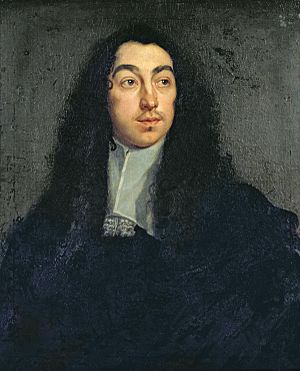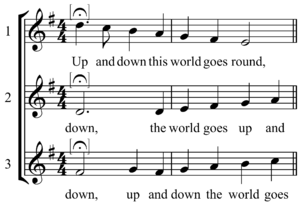Matthew Locke (composer) facts for kids
Matthew Locke (born around 1621 – died August 1677) was an English composer from the Baroque period. He was also a music theorist, meaning he studied and wrote about how music works. Locke was an important musician for King Charles II.
Biography
Matthew Locke was born in Exeter, England. As a boy, he sang in the choir at Exeter Cathedral. His music teacher there was Edward Gibbons.
When Locke was about eighteen, he traveled to the Netherlands. Later, he became a well-known composer.
Locke wrote music for many plays and early operas. For example, he worked with Christopher Gibbons on the music for a play called Cupid and Death in 1653. Their music for this play is the only surviving score from a dramatic work of that time.
Locke was also one of five composers who wrote music for The Siege of Rhodes (1656). This was one of the first English operas. He continued to write music for other operas by Sir William Davenant, including The Cruelty of the Spaniards in Peru (1658) and The History of Sir Francis Drake (1659). Locke even composed the music for the parade when King Charles II was crowned.
In 1673, Locke published a book about music theory called Melothesia. On the title page, he was described as "Composer in Ordinary to His Majesty." This meant he was a special composer for King Charles II and Queen Catherine of Braganza. Locke also composed music for the King's wind instruments and for the violins.
After Locke passed away, another famous composer named Henry Purcell took over his job as Composer for the Violins. Purcell also wrote a special song to remember Locke.
See also
 In Spanish: Matthew Locke para niños
In Spanish: Matthew Locke para niños
- Drexel 3976
Images for kids
 | James Van Der Zee |
 | Alma Thomas |
 | Ellis Wilson |
 | Margaret Taylor-Burroughs |




